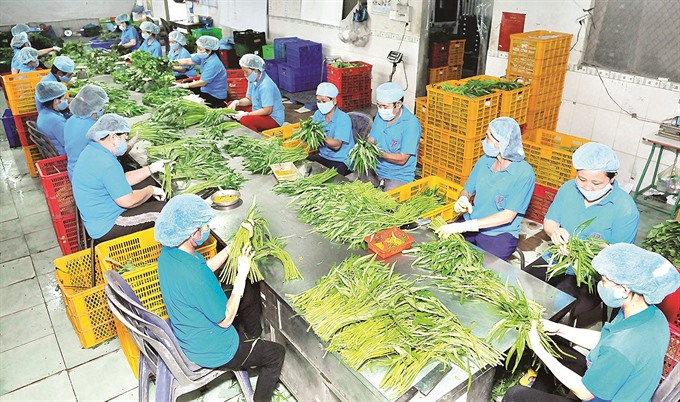.jfif) Opinion
Opinion

The monthly Nhân dân (People) newspaper talks to some experts on what should Vietnamese enterprises do to have their products exported to foreign markets
 |
| Việt Nam should develop a common trademark for our food industry. — Photo sggp.org.vn |
Nhân Dân (People) newspaper talks to experts about what should Vietnamese enterprises do to export their agricultural products to foreign markets
Nguyễn Quốc Toản, acting director of the Agro Processing and Market Development Authority under the Ministry of Agriculture and Rural Development
If we want high-quality agro-products, we should apply modern processing technology.
As we all know, rice exports have created a surplus value for Vietnamese agriculture products. But if we want to export more, we must meet import standards. More recently, with good co-ordination between ministries, agencies, localities and the enterprise community, we have achieved certain successes in organising production chains for some products as well as in processing and re-organising markets for our agricultural products.
The most successful lesson we have learned is in the organisation of production and process chains. Thanks to these chains, we have successfully exported a high quantity of qualitative products with reasonable prices to many foreign markets. In addition, we have also invested a lot in human resources and technological development to offer diverse products with high value added at reasonable prices to be able to compete on the world market. What’s more important is that we have also applied bio-technology in order to keep the fruits fresh with a reasonable expiry date.
Regarding market policies, we have focused on improving our trade promotions. To achieve this objective we need support from many agencies, including the Ministry of Industry, the Ministry of Foreign Affairs, the Ministry of Culture and Tourism and Vietnamese embassies and Vietnamese foreign trade bureaux abroad.
Last but not least, we have paid special attention to tracing products from farm to fork. We believe this is the right way for Vietnamese farm products to win the trust of Vietnamese and foreign customers.
Lê Hoàng Tài, deputy director general of the Việt Nam Trade Promotion Agency under the Ministry of Industry and Trade
Việt Nam should develop a common trademark for our food industry. In my opinion, this is very important, both subjectively and objectively. To do that, all commodities associations, trade promotion agencies and enterprises should join hands to build a common picture for the Vietnamese food industry in the international market. The Ministry of Industry and Trade has assigned the Việt Nam Trade Promotion Agency to act as a focal point.
With co-operation and support from the Netherlands and the European Union, Việt Nam has launched a project on brand development strategies for its food and foodstuff industry from now till 2025 with a vision to 2030.
From 2018-2020, we’ll focus on communication activities to raise awareness among Vietnamese and foreign customers. One of our main objectives is to make Việt Nam become a food business centre in Southeast Asia.
PhD Đào Thế Anh, deputy director of the Field Crops Research Institute
Việt Nam should set a target to export its agro-products to high-end markets.
Regarding our policy on rice exports, we have already switched to high quality rice. As a result, Vietnamese rice is now highly rated on the international market. At cetain times, our rice fetches more than Thailand. This is a good sign for us. However, in the long run, if we want to enter the high-end market, we must improve the quality of our rice. The Government should revise Decree 109 on rice export to facilitate conditions for small enterprises to export Vietnamese special rice varieties to create a trademark for Vietnamese rice.
Adding to that, I should say that our fruit and vegetables have big potential. Most regions in Việt Nam have special products for export.
In my opinion, we should invest more in post-harvest technology. Of course, the Government should also adopt policies to help private enterprises to become exporters, particularly financial support.
Another issue I want to mention is that the Government needs to develop a good logistics system to help farmers and enterprises to transport agro-products from farms to ports and then to foreign importers. Vietnamese enterprises have expressed their interest in investing in this domain, and so have some foreign companies.
Nguyễn Hữu Tài, chairman of the Việt Nam Tea Association
Firstly, we should focus on improving the quality of our export tea.
Việt Nam is the 5th largest tea exporter in the world. We have some 124,000ha of tea plantations and more than 500 tea processing plants with a total production of over 500,000 tonnes of dried green tea per year. However, most of our tea is exported to the Middle East, Taiwan and Russia in the form of raw materials. As a result, the price of Vietnamese tea is very low – just US$1.5 per kg. This is something we should focus more on to improve the quality of our tea to gain a higher price, at least $3.5 like Kenya or $4 from India.
Tea from some Vietnamese enterprises has been able to penetrate high-end markets like the US, Japan and the EU, but the export volume is still very modest.
More recently, the Vietnamese Tea Association has recommended that enterprises conduct research on international markets in order to tune in to their requirements. This is the only way for enterprises to raise the value of their products and build trademarks in the international market. — VNS




